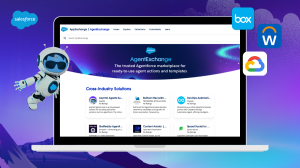RAND Europe conducts independent and objective policy research to inform the public good. RAND Europe’s current ongoing work on behalf of Salesforce to examine the evidence of the digital skills gap should not be taken as a commercial endorsement of any product or service. The research findings underpinning the infographic/narrative were subject to RAND Europe’s rigorous evaluation process.
The digital skills gap has hit an inflection point. Companies are facing a new challenge in a digital-first world: there’s just not enough people with the right digital skills to power their companies’ transformation now and in the future.
There is low supply and high demand for digital skills, and the gap continues to widen due to an array of factors ranging from new emerging technologies to systemic social and economic inequities.
The decisions companies make now around how — or whether — to solve the digital skills gap will echo for future generations.
To better understand why the digital skills gap is widening and what business can do in response, Salesforce commissioned RAND Europe to carry out a study that examines the evidence associated with various aspects of the digital skills gap. Below are the emerging insights.
What is the digital skills gap?
Digital skills cover a range of abilities related to the use of digital devices, communication applications and networks to access and manage information — from basic online searching and emailing to specialized programming and development.
The last 18 months has rapidly accelerated what was a gradual, decade-long migration to digital-first experiences, which require digital skills to power them.
This seismic shift, however, has coincided in the widening of an already large digital skills gap in the workforce.
Sustained investment in digital skills to support the shift in career opportunities driven by digitalization is imperative to the global economic recovery and to resilient, long-term economic growth.
This is a pivotal moment — a unique opportunity for companies to both add future value to their business and drive equity and inclusion in the communities where they operate.
The drivers of the digital skills gap: An analysis
There are multiple drivers of the skills gap:
- The demand for tech talent is outpacing an already short supply
- Emerging technologies amplify the need for digital skills
- High costs and disorganized approaches with traditional education increase barriers to learning
- Access to digital infrastructure and skills is limited by socio-economic status
Sadly, the democratization of digital skills will not reach every country, industry, and community equally. Until people from underserved and underrepresented backgrounds are able to get equal access to technology and education for re-skilling, the skills gap will continue to grow
Success, prosperity, and equality in the new digital-first world will therefore depend on everyone having the skills to participate.
Bridging the digital skills gap
Addressing the digital skills gap is now recognized globally as an important driver of increased business competitiveness, employee performance and satisfaction, and customer experience (Capgemini, LinkedIn).
Various campaigns, projects, and initiatives are already underway across private and public sectors to close the gap, and their number is increasing.
Businesses have an important role to play in providing digital opportunities:
- Promoting tech careers as a platform for fair progression, meaningful, lifelong learning and enjoyment.
- Executing far-reaching programs that smash institutional barriers such as poor access to skilling and racial and gender inequality.
- Resetting recruitment to focus less on traditional education and more on skills, opening up digital roles to a wider, more diverse talent pool and delivering a more positive socio-economic impact.
- Creating non-traditional pathways into the tech industry.
Now more than ever, businesses must work closely with governments and community stakeholders to ensure that training scales up to match digital demand and accelerate recovery and growth.
The Salesforce contribution
Salesforce recognizes, too, that there is no one skills gap and no one-size-fits-all approach. The company supports the skilling imperative via a variety of platforms, projects, initiatives, and investments that offer something to everyone.
Ultimately, these efforts work together to seek to help people of all backgrounds find and confidently progress their own skilling journey to rewarding, life-changing employment.
Salesforce does this through free training via its online learning platform Trailhead, the creation of partnerships with leading education providers, and by delivering a raft of trailblazing apprenticeship, skilling, grants and philanthropic programmes internationally.
Working with partners
- Salesforce works with implementation partners including Accenture, Deloitte, and IBM to scale Salesforce products and services for the digital economy, elevate training and create new jobs requiring Salesforce skills.
Creating job opportunities and future digital leaders
- Salesforce collaborates with educators around the world to define untapped talent — offering apprenticeships to young adults from underserved, underrepresented communities that need an alternative route into the technology sector and can add real value.
- Salesforce’s Futureforce University recruiting program is dedicated to attracting, retaining and developing graduate talent.
- Trailblazer Mentorships connect mentees to opportunities to land dream jobs in the Salesforce ecosystem. All levels are welcome — no degree or prior Salesforce work experience is required.
Workforce development programs
- Salesforce Talent Alliance is an initiative that connects partner companies to a diverse pool of Salesforce-trained candidates in an effort to skill up the workforce of the future.
- Pathfinder Training Program, launched in 2018 in collaboration with Deloitte, is a workforce development initiative designed to train individuals with the technical, business and soft skills necessary to pursue a career in the Salesforce ecosystem.
- Salesforce Military offers free, online training classes and certification exams at no cost for active-duty military, veterans, and military spouses. Salesforce connects a talented pipeline with partner companies to help grow, strengthen, and diversify their workforce.
- Trailblazer Connect helps people connect to mentorship and career opportunities through events and online resources.
- Salesforce.org: Supports nonprofits and schools working to close the opportunity gap for future generations through education via Salesforce’s 1-1-1 model.
Grants and investments
- Through its Grants Programs, Salesforce is helping the next generation of enterprise technology get up and running, supporting the digital skilling imperative.
- Salesforce recently announced a new $700,000 donation to leading workforce development non-profit Year Up, which connects young adults and top companies to launch meaningful careers. This brings the company’s total commitment to $30M.
Every business has a major opportunity as the world transitions out of the COVID-19 crisis: to make positive change happen.
A commitment to bridging the widening digital skills gap is fundamental to our world’s future success and prosperity. And, doing so in a manner that promotes equity and effectively leverages untapped talent within the workforce.
Learn more about how Salesforce is doing its part:


















